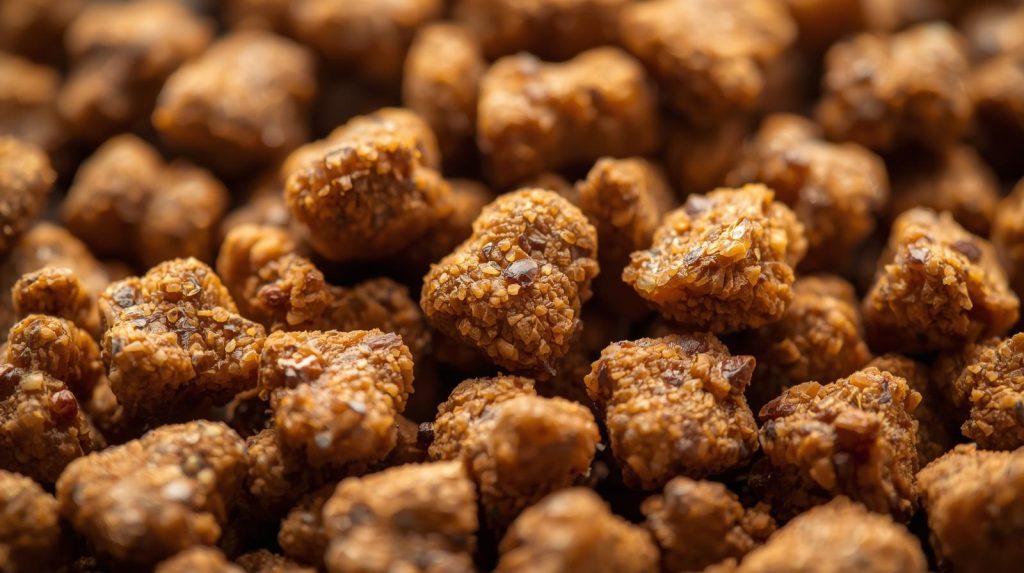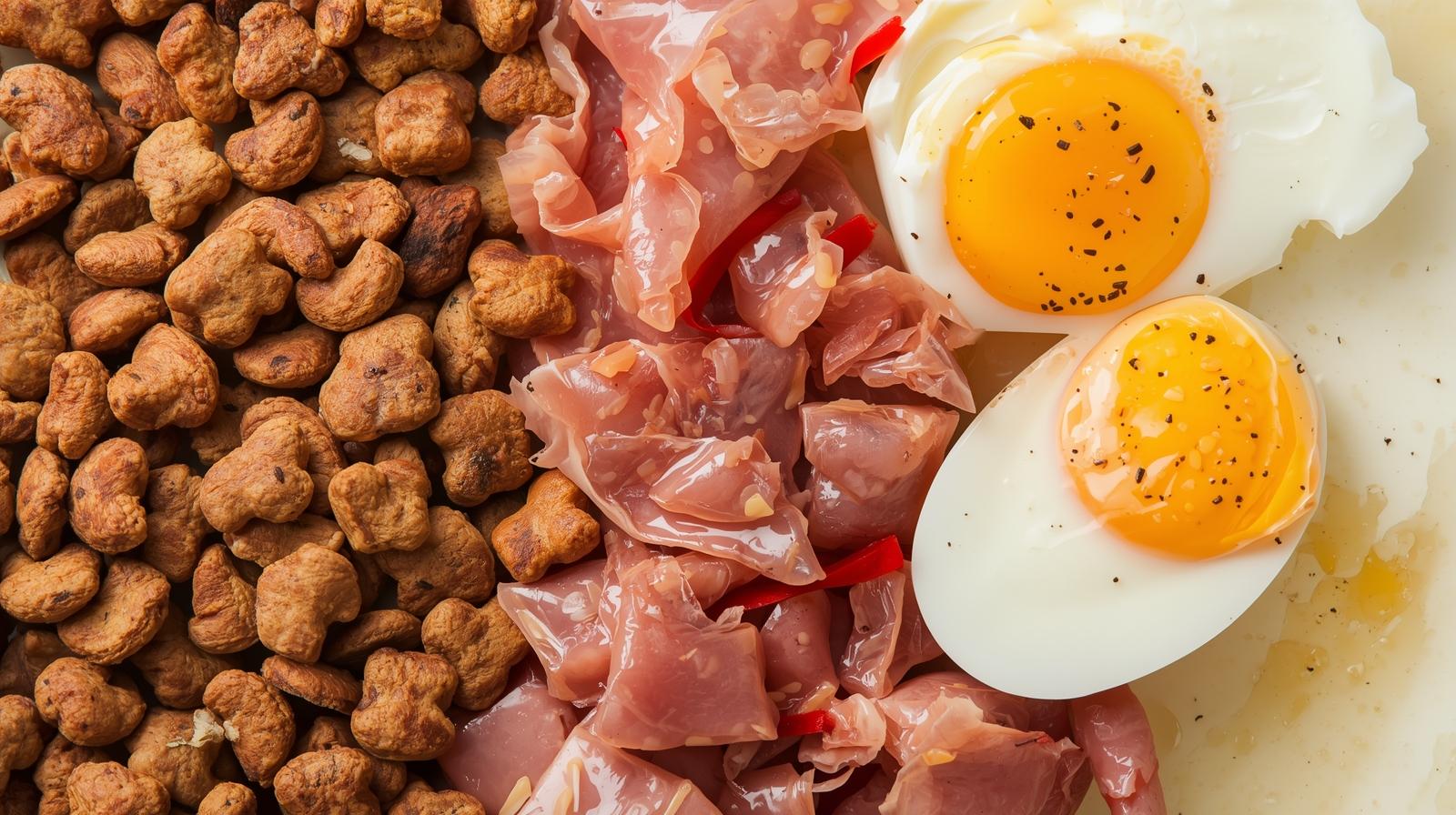Protein is the most important nutrient in your dog’s diet. Whether your dog is a playful puppy or a calm old dog, protein is important for them at every stage of their life. It helps the immune system work better, muscles grow, tissues heal, and even gives your dog a shiny coat.
But not all proteins are the same. The type, amount, and source of protein your dog eats can have a big effect on their health, energy, and life span. It can make a big difference in your dog’s diet if you know how much and what kind of protein they need.
This article will tell you everything you need to know about protein in dog food, such as its benefits, how much your dog should get, the best sources, and how to make sure your pet is getting the nutrients they need.
Why protein is important in dog food
People often call protein the “building block of life” for good reason. It is made up of amino acids, which are needed for almost all body functions, such as making hormones, building muscles, and keeping the immune system strong.
Dogs need protein for:
- Active breeds and puppies need to keep their muscles strong and grow them.
- Healing tissue after exercise or an injury.
- Cysteine and methionine are amino acids that help keep skin and coat healthy.
- When there aren’t enough lipids and carbohydrates, energy is made.
- Control of hormones and enzymes for a healthy metabolism.
- If dogs don’t get enough protein, their immune systems may weaken, they may get tired, lose muscle, and their coats may not look good. Because of this, one of the most important things any pet owner can do is choose a dog food that is high in protein.
How Much Protein Does Your Dog Need?
The right amount of protein for a dog depends on its age, breed, size, and how active it is.
This is a general rule of thumb:
Puppies need the most protein (about 22–32%) because they grow so quickly.
Adult dogs need a lot of it (18–25%) to keep their muscles and energy up.
Active or working dogs may need 25–30% or more for their muscles to heal and their endurance to improve.
Senior dogs might benefit from protein that is easier to digest in order to help them keep their muscles without putting too much stress on their kidneys.
The quality of the protein is more important than the amount. Plant-based proteins may lack some of these essential nutrients, whereas high-quality animal proteins provide all necessary amino acids in appropriate proportions.
Different kinds of protein in dog food
Different proteins have different benefits. Knowing that dog food proteins can come from plants or animals can help you make better choices about what to feed your dog.
Proteins that come from animals
These are the best biological sources for dogs. They are easy to digest and full of important amino acids.
Animal proteins usually have:
- Turkey and chicken are low in fat, easy to digest, and often used in dog food.
- Beef and lamb are high in iron and amino acids, which help muscles heal.
- Fish, like salmon and whitefish, are a great source of Omega-3 fatty acids that are good for skin and coats.
- Eggs are known as the “perfect protein” because they are full of nutrients and easy to digest.
- Animal proteins are the best thing for dogs to eat because they are very similar to what dogs would naturally eat.
Plant-based proteins
Plant proteins like peas, lentils, chickpeas, and soy are becoming more common in dog diets that don’t include grains or meat. These can help dogs get more protein, but they don’t always give them all the amino acids they need.
Make sure your plant-based diet is balanced with animal sources or has amino acids added to it to avoid deficiencies.
High-quality protein vs. low-quality protein
Just because a dog food says it’s “high in protein” doesn’t mean it’s good for them. The quality of the protein depends on how well your dog’s body absorbs and digests it.
High-quality proteins come from real meat, fish, or eggs. They are easy to digest and have a lot of important amino acids.
Low-quality proteins often come from by-products or fillers, like corn gluten meal or beef meals from unknown sources. These are not as good for dogs and are harder for them to digest.
Instead of vague terms like “animal meal,” look for specific meat names on dog food labels, like “chicken” or “salmon.” Trust is like being open.

Benefits of Having Enough Protein in Dog Food
A diet high in high-quality protein will help your dog in many ways. Let’s take a look at some of the most important ones:
Helps Build Lean Muscle: Protein helps muscles grow and stay strong, which is especially important for big, active dogs and puppies.
Protein’s amino acids help make antibodies that protect against infections and diseases, which allows the immune system to work better.
Encourages Healthy Skin and Coat: A silky, shiny coat is often a sign of good nutrition. Protein building blocks make up keratin, which is an important structural protein in skin and hair.
Increases Energy Levels: Protein is a backup energy source for active or working breeds when carbs are hard to come by.
Helps with Recovery: Extra protein helps tissues heal quickly and regain strength after surgery, exercise, or illness.
Keeping the right amount of protein in your dog’s food will keep them strong, active, and healthy.
Is it risky to eat too much protein?
Your dog needs to get enough protein, but too much of it can be bad for them, especially if they already have liver or kidney disease. Dogs in good health usually don’t mind having too much protein because their bodies turn it into energy.
If your vet has found kidney problems, you should talk about a high-quality, moderate-protein diet that puts less stress on the kidneys. Always speak to a vet before making big changes to your diet.
Tips for Choosing the Best High-Protein Dog Food
Here are some useful tips to help you make a smart choice:
Look at the list of ingredients: Real meat should be the first thing.
Avoid fillers: Don’t buy things that say wheat gluten, soy, or corn are the main ingredients.
Look for balance: In addition to protein, make sure the diet has vitamins, minerals, and good fats.
Think about what your dog needs: Different breeds of dogs, puppies, and older dogs require different amounts of protein.
Different sources of protein: Eating more beef, fish, and chicken can help with allergies and add variety to your diet.
When choosing the right protein for dog food, you should put quality ahead of what the ads say. A trustworthy brand has a clear label, clear sourcing, and support from vets.
FAQs About Dog Food Protein
1. What is the best protein source for dog food?
The best sources of protein are foods that come from animals, like chicken, beef, lamb, fish, and eggs. They have all the important amino acids that a dog needs to grow, get energy, and heal.
2. How much protein should my dog eat every day?
An adult dog needs to eat about 18–25% protein. Puppies and breeds that are very active may require 25% to 30%. Always check the brand’s food guide or talk to your vet if you have special needs.
3. Is it okay for dogs to eat plant-based protein?
You can add plant-based proteins to your diet, but they shouldn’t be the only source. Dogs get more complete amino acids and break down animal protein better.
4. Is it possible for dogs that eat a lot of protein to have kidney problems?
Most healthy dogs can eat meals that are high in protein. But dogs with kidney problems that are already there may need to eat less protein while they are under the care of a vet.
5. How do I know if my dog is getting enough protein?
A shiny coat, steady energy, healthy muscle tone, and overall health are all signs that you are getting enough protein. If your dog looks tired, loses weight, or has dull fur, they might not be getting enough protein.
Conclusion: Give your dog the right protein to keep them healthy.
Protein is not just another vitamin; it’s the most important thing for your dog’s health and energy. There are many benefits to giving your dog enough protein, such as strong muscles, a shiny coat, and endless energy.
For the best results, pick a diet that is right for your dog’s age and level of activity, has real meat as the main ingredient, and gives them a good mix of nutrients. Remember that what you feed your dog today will have an effect on their health for years to come.


